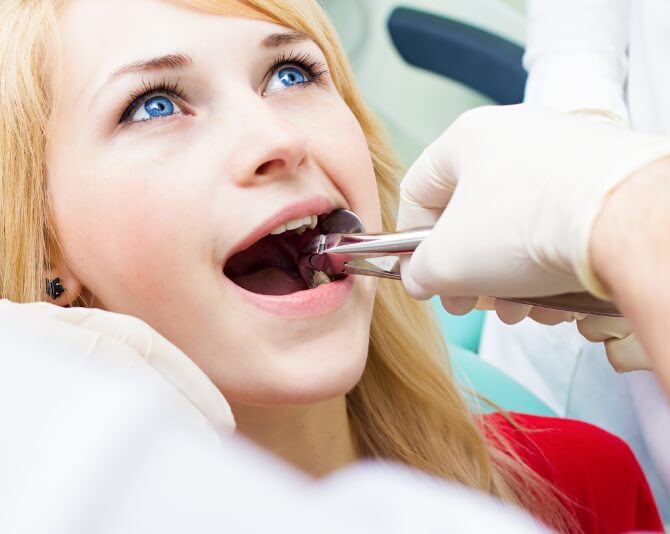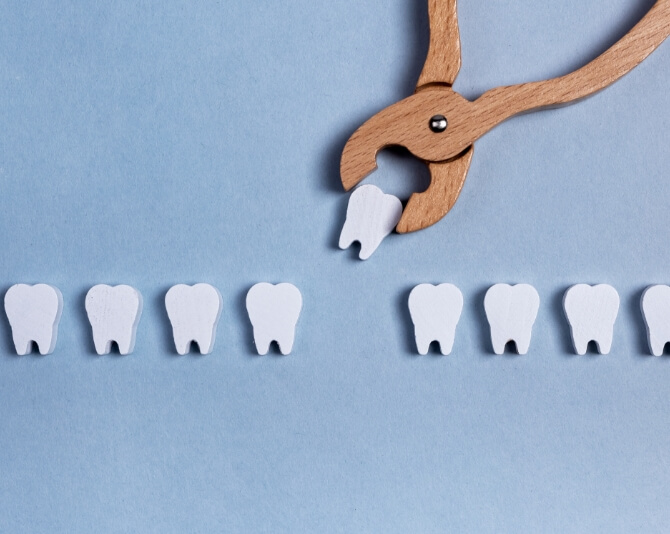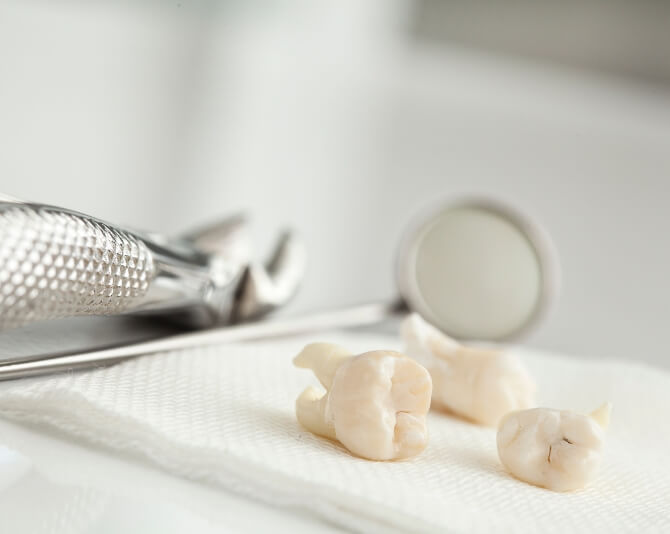Tooth Extractions Edison
Protecting the Future of Your Smile

Since saving your natural teeth is always a priority of ours, we only recommend extractions as a last resort. Oftentimes, that’s the case for more severe dental problems, such as severe infections and trauma. In that case, Dr. Vrajesh Shah will conduct a thorough exam, discuss each of your restorative options, and outline a treatment plan. We can even add nitrous oxide to ensure you feel more comfortable throughout the procedure. If you want to learn more about tooth extractions in Edison, then schedule an appointment with our team or keep reading!
Why Choose Edison Prosthodontics for Tooth Extractions?
- Same-Day Emergency Appointments
- Implant-Retained Replacement Teeth
- Sedation Dentistry Available
Reasons Why Tooth Extractions Are Necessary

Here are some situations that may require an extraction:
- A tooth is severely broken or damaged and can’t be repaired.
- Decay has destroyed most of a tooth’s structure.
- A tooth needs to be removed to create enough room in the mouth for orthodontic treatment.
- A tooth is loose as a result of gum disease.
- More room is needed to help a denture fit securely.
The Process of Removing a Tooth

First, our dedicated emergency dentist, Dr. Shah, will thoroughly examine your mouth and take digital X-rays to determine whether your tooth is salvageable or not. If it is severely damaged and may put your oral health at risk, he’ll likely suggest having it extracted to prevent additional damage.
If the tooth that needs to be removed has broken through your gumline, then Dr. Shah will administer a local anesthetic and gently rock the tooth back and forth until it painlessly slips out. If the tooth hasn’t fully erupted, then the process will look slightly different. Although the first step is the same (administering a local anesthetic), he will need to also create a small incision to access the tooth. Most often, this approach is needed for impacted wisdom teeth.
After the procedure, our team will discuss restorative solutions. Then, you’ll be another step closer to your best smile!
Tooth Extraction Aftercare

Immediately following your procedure, it’s normal to experience some light swelling, bleeding, and discomfort. To keep you as comfortable as possible during this time, we will provide you with a detailed list of aftercare instructions, including:
- Taking OTC pain relievers as directed.
- Not participating in any physically strenuous activities, like weightlifting.
- Eating soft foods, like soup, oatmeal, and yogurt.
- Drinking plenty of water to stay hydrated (but not through a straw).
- Keeping your mouth clean by rinsing with warm saltwater.
- Not smoking or spitting.
If you ever have any questions about the tooth extraction process – from what to eat the morning of to how to make your recovery as smooth as possible – don’t hesitate to let us know so we can help!
Understanding the Cost of Tooth Extractions

Having a tooth removed is often an important step for protecting your smile. But will you be able to fit the cost of the procedure into your budget? The price of a tooth extraction won’t be exactly the same for every patient, but we can give you a reliable idea of what it will look like when you first visit our office for a consultation. Remember that you can always speak to one of our helpful team members if you have questions about the cost of the extraction process.
Factors That Can Affect Tooth Extraction Cost

Not all tooth extractions are the same; there are several factors that could end up influencing the overall cost. For example, molars tend to be more difficult to remove due to their location near the back of the mouth and the fact that they have more roots. As a result, you may end up paying more for tooth extractions involving the molars.
Furthermore, some extractions are more complex than others. Sometimes you may have multiple teeth that need to be taken out. Additionally, some teeth can be removed via a simple extraction while others call for a surgical approach. The number of teeth involved with the extraction procedure and the type of extraction performed both play a role in determining the overall price.
Finally, you should remember that any prosthesis that you get to replace your missing teeth will have a separate cost from the extraction procedure. As such, you need to make sure there’s room in your budget for a dental bridge, dentures, or dental implants.
Does Dental Insurance Cover Tooth Extractions?

You can normally expect your dental insurance to help pay for a tooth extraction. Coverage is often around 50% of the cost of the procedure, but this isn’t set in stone; it ultimately depends on what dental plan you have. You should talk to your dental insurance provider to make sure you understand the details of your plan before you begin the tooth extraction process. Of course, you can also turn to our team if you have any insurance-related questions. We’re in-network with a number of plans and accept out-of-network plans as well.
How to Make Tooth Extractions Affordable

Is it looking like the total cost of a tooth extraction will put a strain on your bank account? Oftentimes, you can make things easier by applying for CareCredit financing. With CareCredit, you can choose from a number of payment plans, many of which come with little or no interest. Once you have chosen a plan that works for you, all that’s left is to pay for your treatment in a series of monthly installments. It’s easier to afford the care you need when you can break up the cost.
Tooth Extraction FAQs
Is There an Alternative to Tooth Extraction?
There are many ways to potentially treat a damaged or infected tooth, such as with a filling or a crown. But if you have been told that you need a tooth extraction, that likely means that the tooth has reached the point where there are no longer any viable alternatives. Tooth extraction is typically seen as a last resort; it is only suggested if it is absolutely necessary for protecting the overall health of your mouth. The good news is there are multiple ways to replace a tooth after it has been extracted, so there’s no need to give up on having a complete smile.
Does Getting a Tooth Extracted Hurt?
Some patients are worried that the tooth extraction process will involve considerable pain. However, these fears are unfounded; we will always take the time to numb your mouth first so that you can stay comfortable while your tooth is being removed.
As for the soreness and discomfort that are normally part of the recovery process, they can be managed with prescription or over-the-counter painkillers. Please carefully follow any aftercare instructions provided by our team to make sure that recovery goes as expected. Contact us right away if your pain suddenly gets worse or if there are signs that you may have developed an infection.
Can I Smoke After Getting a Tooth Extracted?
No. Tobacco can have an adverse effect on the healing process, so you will need to avoid smoking after your tooth extraction. Even e-cigarettes can cause problems. Ideally, you should avoid smoking for two weeks following the extraction process. Of course, breaking a smoking habit can be easier said than done; it may be a good idea to do a little research in order to find out what options are available to make it easier to stay away from tobacco.
What Risks Are Involved with Tooth Extractions?
There is a low chance that an infection could occur after your tooth is extracted. If you want to avoid this problem, be sure to protect the blood clot that forms in the area where the tooth used to be. Said clot is essential for keeping your mouth safe from infection until the recovery process is complete.
In the event that the blood clot becomes dislodged, you may suffer what’s known as a dry socket, which is not only painful but can also disrupt the recovery process. Our team can give you tips for making sure that the blood clot stays where it needs to be.



